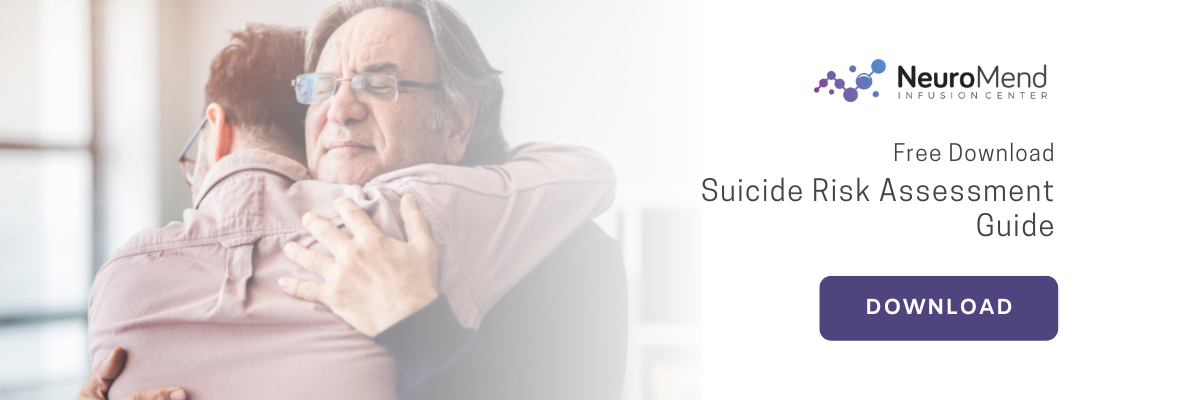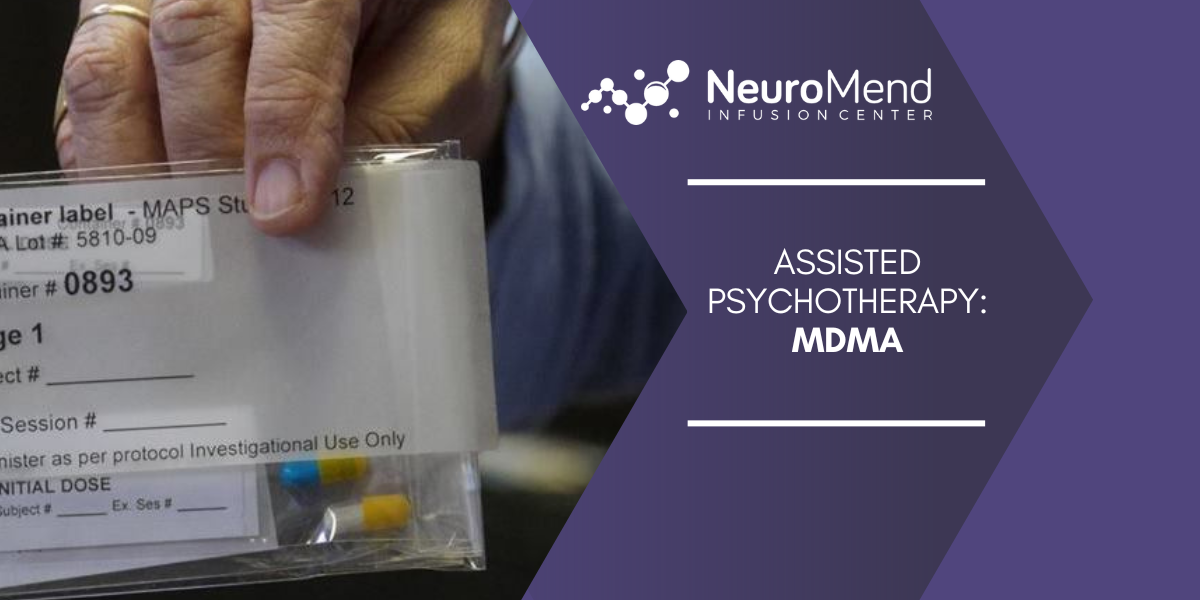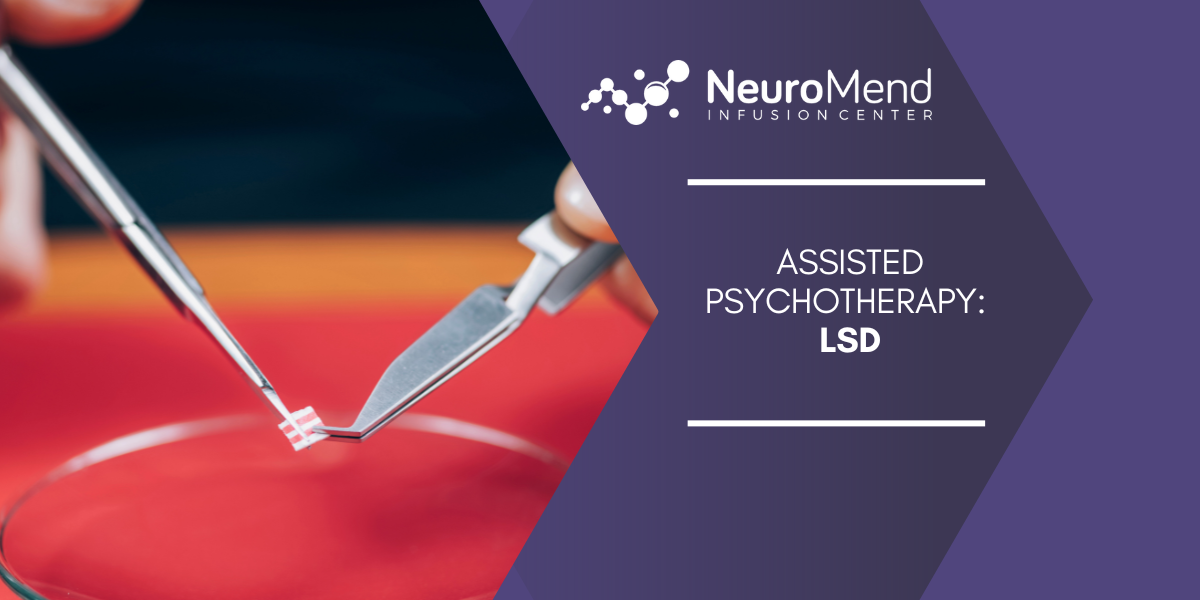.png?width=648&name=Blog%20Featured%20Image%20-%20NeuroMend%20(1).png)
For those involved in patient care, it is important to be aware of the nature and prevalence of suicidal behaviors and the factors that are associated with suicide.
The annual U.S. suicide rate increased 30% between the year 2000 and 2020. Suicidal ideations and behaviors are most commonly found among people with anxiety, bipolar disorders, chemical dependency, personality disorders, psychiatric disorders, PTSD, and schizophrenia.
In this suicide risk assessment, we will be covering suicide risk, suicidal ideations symptoms, suicidal ideation treatment and ketamine for suicidal ideation.
- Factors That Contribute to Suicide and Suicidal Ideation
- Warning Signs of Suicidal Behavior
- Important Questions to Ask
- 988 Suicide and Crisis Lifeline
- Ketamine Treatment for Suicidal Ideation

Factors That Contribute to Suicide and Suicidal Ideation
The most common determinant of future suicide attempts is history of attempting suicide and intentional self-injury (without expressing the intention to die).
Factors that may increase risk or decrease risk are those that have been found to be statistically related to the presence or absence of suicidal behaviors. These factors serve as guidelines for clinicians to weigh the risk of an individual engaging in suicidal behaviors.
Some risk factors are immutable (age, gender, race/ ethnicity), while others are situation-specific (loss of housing, exacerbation of pain in a chronic condition, onset or exacerbation of psychiatric symptoms). Because of this, no risk factor nor protective factor ensures engagement in suicidal behaviors; these factors are not equal.
A clinician uses their knowledge of an individual’s risk and protective factors to better evaluate their current risk for suicide.
Factors that may increase a person’s risk for suicide include:
- Age, gender, or race
- Alcohol / Substance abuse
- Co-morbid health problems (newly diagnosed or worsening symptoms)
- Current ideation, intent, and plan
- Current or previous history of psychiatric diagnosis
- Family history of suicide
- History of abuse (physical, sexual or emotional)
- Hopelessness (the presence of, the duration of time, and the severity of it)
- Impulsivity and poor self control
- Previous suicide attempt or attempts
- Recent losses (physical, financial, or personal loss)
- Recent discharge from an inpatient psychiatric unit
- Same-sex sexual orientation
Protective factors, which decrease the risk for suicide, include:
- Children in the home
- Life satisfaction
- Positive coping skills
- Positive social support
- Positive problem-solving skills
- Positive therapeutic relationship
- Pregnancy
- Reality testing ability
- Sense of responsibility to family
- Spirituality
Warning Signs of Suicidal Behavior
Although there are several risk factors, they alone do not increase or decrease the risk of suicide. Research suggests that the risk for suicide increases with an increase in the number of risk factors present.
In the event that a clinician should see these signs, there is a critical risk for the expression of suicidal behaviors, especially in those individuals with other risk factors. There are three factors which are more likely to cause short-term appearance of suicidal behaviors and require immediate attention and evaluation.
If any of the these signs are present, you should immediately request further evaluation from a mental health provider.
- Looking for ways to kill self (seeking access to pills, weapons or other means)
- Talking or writing about death, dying or suicide
- Threatening to hurt or kill self
The remaining warning signs should alert the clinician that a mental health evaluation needs to be conducted in the near future and that precautions need to be put into place immediately.
- Acting reckless or engaging in risky activities, seemingly without thinking
- Anxiety, agitation, unable to sleep or sleeping all the time
- Dramatic changes in mood
- Feeling trapped – like there’s no way out
- Hopelessness
- Increasing alcohol or drug abuse
- No reason for living, no sense of purpose in life
- Rage, anger, seeking revenge
- Withdrawing from friends, family or society

Important Questions to Ask
It isn't easy to ask personal questions about suicidal ideation, intent, plan, and attempts. Although sometimes patients ask about suicide, usually the topic does not present itself from the complaint and the gathering of history related to the present illness.
By setting the stage for a series of questions and signaling to patients that the questions are a natural part of the overall assessment.
For example:
I appreciate how difficult this problem must be for you at this time. Some patients with similar problems/symptoms have told me that they have thought about ending their life. I wonder if you have had similar thoughts.
The questions form a cascading questioning strategy where the answer would naturally lead to another question, which will elicit additional important information.
Are you feeling hopeless about the present or future? If yes, ask…
Have you had thoughts about taking your life? If yes, ask….
When did you have these thoughts, and do you have a plan to take your life?
It is important to ask people about a history of attempts, feelings of hopelessness, and ideation. Although most people who attempt suicide do not attempt again, about 16% repeat attempt within one year and 21% repeat within 1-4 years.
988 Suicide and Crisis Lifeline
For people 10-34 years, suicide is a leading cause of death. In 2020, every 11 minutes there was one death by suicide. Because of the increase in people who are experiencing suicidal crisis, the 988 hotline was created to connect individuals directly to mental health professionals with the 988 Suicide and Crisis Lifeline, by call or text.
The 988 Suicide and Crisis Lifeline is a national network of 200+ crisis centers, open 24/7 and is supported by local and state sources.
Ketamine Treatment for Suicidal Ideation
Standardized antidepressant treatments do not work for everyone. These treatments can sometimes take weeks, or even months, to take effect. During a time period when patients are at risk for continued suffering and suicide attempts, these treatments are not the most ideal.
Ketamine infusions, like other assisted psychotherapies (MDMA and Psilocybin), are a great alternative treatment for individuals and veterans dealing with suicidal ideations and suicide risk. Ketamine for depression treatment (also used in emergency rooms) provide quick and powerful relief, even to people whose depression and ideations have repeatedly failed to respond to other medications.
Most recently, ketamine has been used to treat mood disorders and severe depression, however, recent studies have shown that ketamine has improved the thinking and reasoning of those who expressed thoughts of suicide.
The study found that one dose of ketamine not only reduced the severity of depression in people with suicide ideation, but also made them feel safer and less likely to harm themselves because it rapidly diminished their suicidal ideation.
Ketamine Infusion therapy begins with low dose infusions for the treatment of severe mood disorders. Adjustments can be made during an infusion as well as from one infusion to the next. With a small dose of Ketamine, depression, anxiety, and suicidal ideation decrease.
See here for information about Spravato.
Disclaimer: As of September 29, 2023, NeuroMend no longer offers Spravato treatments. We apologize for any inconvenience and encourage you to consult with our team or your healthcare provider for alternative options.
ASK US ABOUT KETAMINE INFUSIONS
NeuroMend Infusion Center is a ketamine clinic providing ketamine infusions in the Acadiana area, as well as across the state of Louisiana.
We treat patients suffering from depression, anxiety, bipolar disorder and other psychiatric disorders, as well as those struggling with chronic pain conditions.
If you or a loved one is living in darkness, please consider ketamine infusions. Just one ketamine infusion can provide more relief the standard treatments. Contact us today. ❤️
See here about insurance coverage!

References
https://www.fcc.gov/988-suicide-and-crisis-lifeline
https://www.columbiapsychiatry.org/news/ketamine-rapidly-improves-cognitive-function-making-those-suicidal-crisis-less-likely-harm-themselves
ABOUT NEUROMEND INFUSION CENTER
![]() We are an Evidence-Based Center of Excellence and the leading provider of Ketamine Infusions, IV Infusions and Ketamine Consulting Services for Ketamine Clinics and IV Therapy Clinics.
We are an Evidence-Based Center of Excellence and the leading provider of Ketamine Infusions, IV Infusions and Ketamine Consulting Services for Ketamine Clinics and IV Therapy Clinics.
We Provide Effective Treatment For The Following Conditions: Major Depressive Disorders, Post-traumatic Stress Disorder (PTSD), Bipolar Depression, Obsessive Compulsive Disorder (OCD), Chronic Migraines, Severe Anxiety.









